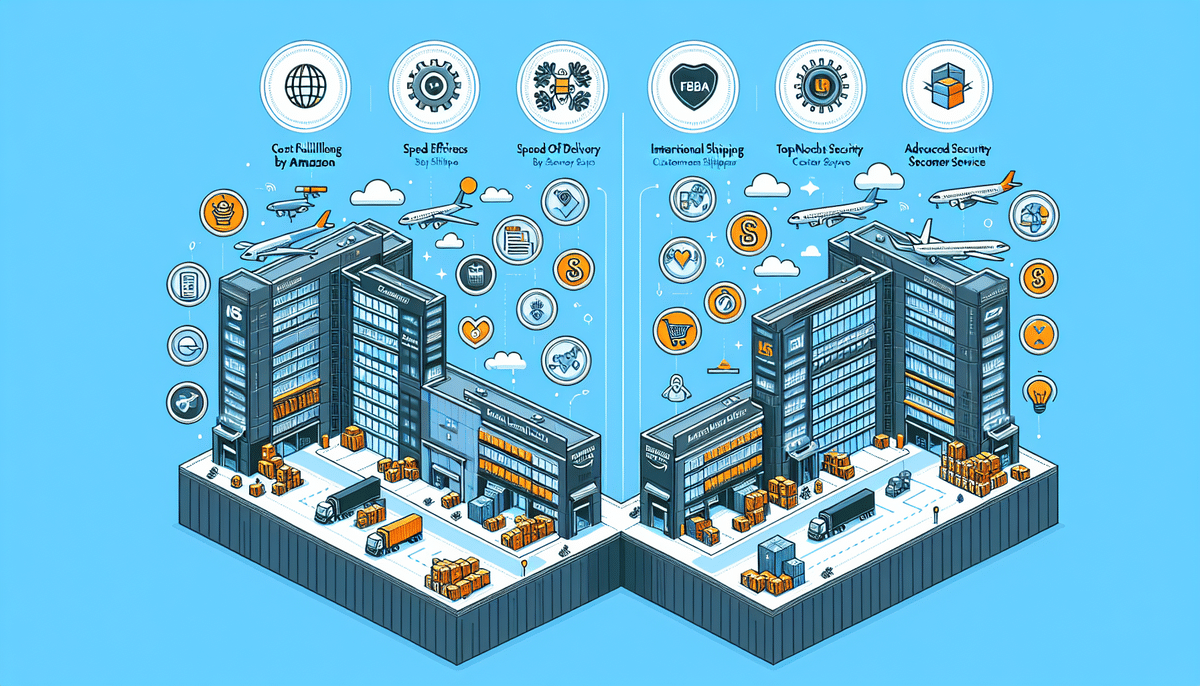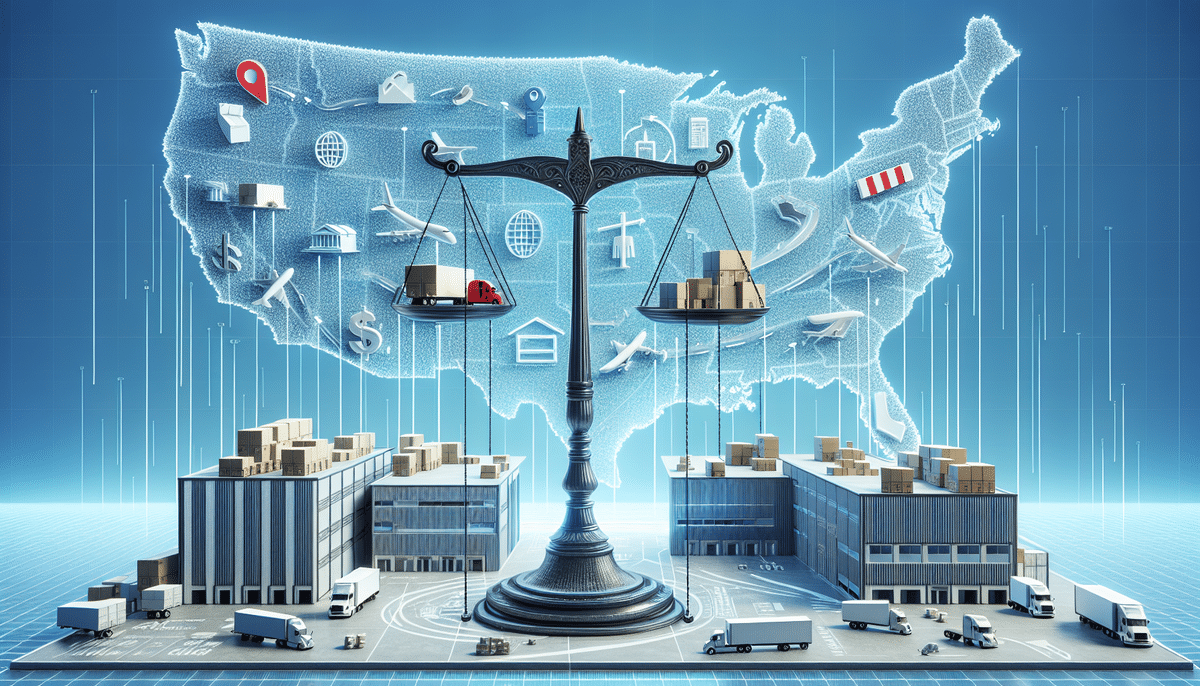Fulfillment by Amazon (FBA) vs Rakuten Super Logistics: An In-Depth Comparison
Ecommerce has revolutionized the way we shop and sell. However, the backbone of every successful ecommerce business is its fulfillment strategy. Fulfillment entails storing, packaging, and shipping products to customers. This article compares two popular ecommerce fulfillment services: Fulfillment by Amazon (FBA) and Rakuten Super Logistics. We will explore how they work, costs, benefits for small businesses, customer service, shipping times, handling of returns, international shipping options, security measures, pros and cons, success stories, expert opinions, and provide a final recommendation for businesses.
Operational Overview: How FBA and Rakuten Super Logistics Work
Both FBA and Rakuten Super Logistics offer comprehensive warehousing and shipping solutions tailored to ecommerce businesses:
- FBA: Stores your inventory in Amazon's extensive fulfillment centers and manages the packaging and shipping of orders placed on Amazon. Sellers can also use FBA to fulfill orders from other sales channels.
- Rakuten Super Logistics: Stores your inventory in their warehouses and fulfills orders from multiple sales channels. Upon receiving an order, Rakuten processes it by picking, packing, and shipping to the customer.
Pricing Structures
Understanding the pricing models is crucial when choosing between FBA and Rakuten Super Logistics:
- FBA: Fees are based on the size and weight of products, as well as storage duration. During peak seasons, storage costs may increase. FBA also offers the "Small and Light" program for products under 10 ounces, providing lower fees.
- Rakuten Super Logistics: Charges a flat rate per order, including pick-and-pack and shipping fees, which can be more cost-effective for lower-volume businesses. They do not have an equivalent to FBA's "Small and Light" program.
For businesses with high return volumes, it's noteworthy that FBA charges a return processing fee per return, whereas Rakuten Super Logistics does not, potentially offering cost savings.
Cost Analysis: FBA vs Rakuten Super Logistics
Cost is a critical factor in selecting a fulfillment service:
- FBA: Involves storage fees based on volume and duration, fulfillment fees based on item size and weight, and additional fees during high-demand periods. However, FBA provides access to Amazon's vast infrastructure and customer base.
- Rakuten Super Logistics: Implements a straightforward fee structure with per-order, pick-and-pack, and shipping fees. This simplicity can aid small businesses in budgeting, but the absence of a "Small and Light" program may influence costs for lightweight items.
In addition, Rakuten Super Logistics may be more cost-effective for businesses that handle a significant number of returns due to their no return processing fees.
Benefits for Small Businesses
Small businesses require fulfillment services that are affordable, scalable, and efficient:
- FBA: Offers shipping discounts, promotional tools, and advanced inventory tracking, which can be advantageous for growing businesses.
- Rakuten Super Logistics: Provides flexible pricing options and scalable solutions, making it ideal for startups and businesses with fluctuating sales volumes.
For businesses prioritizing fast and reliable shipping, FBA's extensive warehouse network and shipping carriers may be preferable. Conversely, Rakuten Super Logistics offers cost-effectiveness and scalability, suitable for businesses with limited sales history or budget constraints.
Customer Service and Support
Reliable customer service is essential for seamless operations:
- FBA: Provides 24/7 customer support via phone and email, along with a self-service portal for managing orders and returns.
- Rakuten Super Logistics: Offers 24/7 support through a dedicated account manager and an intuitive platform, delivering personalized service.
Both services ensure accurate tracking and prompt issue resolution. The choice may depend on whether businesses prefer the extensive support network of FBA or the personalized service approach of Rakuten.
Shipping Times and International Options
Shipping speed and international capabilities impact customer satisfaction:
- FBA: Leverages Amazon's vast network to offer same-day and two-day shipping options. Additionally, FBA provides robust international shipping and customs clearance support, making it suitable for global expansion.
- Rakuten Super Logistics: Offers same-day shipping cutoff times and customizable shipping options within the continental United States, including a 2-day delivery guarantee. However, their international shipping options are more limited.
FBA is generally faster and better equipped for international shipping, while Rakuten Super Logistics excels in customizable, reliable domestic shipping.
Handling Returns and Refunds
Efficient return handling enhances customer trust:
- FBA: Manages returns and refunds on behalf of sellers, with free return shipping for eligible products. Their policies on the condition of returned items are strict to maintain inventory quality.
- Rakuten Super Logistics: Facilitates a straightforward returns process without charging return processing fees and allows more flexibility concerning the condition of returned items, provided they are usable.
FBA is suitable for sellers who prefer a hands-off approach to returns, while Rakuten Super Logistics offers greater flexibility for businesses with varied return policies.
Security Measures
Ensuring data and inventory security is paramount:
- FBA: Utilizes Amazon's secure cloud infrastructure and advanced encryption to protect data and inventory.
- Rakuten Super Logistics: Employs SSL encryption and secure data-sharing platforms to safeguard information. They also conduct regular security audits and provide insurance options against theft or damage.
Both services prioritize security, implementing strict access controls and employee training to minimize risks.
Pros and Cons of FBA vs Rakuten Super Logistics
Fulfillment by Amazon (FBA)
- Pros:
- Fast and reliable shipping through Amazon's vast network.
- Access to Amazon's customer base and Prime members.
- Comprehensive fulfillment features and promotional tools.
- Cons:
- Higher fees, especially during peak seasons.
- Potential restrictions on product categories.
Rakuten Super Logistics
- Pros:
- Cost-effective flat-rate pricing per order.
- Flexible and scalable solutions tailored to small businesses.
- No return processing fees.
- Cons:
- Longer turnaround times compared to FBA.
- Limited international shipping options.
- Fewer advanced features and integrated promotional tools.
Success Stories and Expert Opinions
Both FBA and Rakuten Super Logistics have facilitated the growth of numerous ecommerce businesses:
- FBA: Companies like FlyByrd Apparel and Riversong Guitars have significantly scaled their operations by leveraging FBA's robust infrastructure and fast shipping capabilities.
- Rakuten Super Logistics: Businesses such as Danzia and Smoking Vapor have benefited from reduced fulfillment costs and enhanced operational efficiency.
Industry experts commend FBA for its comprehensive features and reliable shipping, albeit noting the higher costs and certain limitations. Conversely, Rakuten Super Logistics is praised for its cost-effective, flexible solutions and scalability, with some concerns regarding shipping speed and international reach.
Conclusion: Choosing the Right Fulfillment Service for Your Ecommerce Business
Both FBA and Rakuten Super Logistics provide reliable and efficient fulfillment services tailored to different business needs. FBA is ideal for businesses with high sales volumes, international expansion plans, and a need for advanced features and fast shipping. Rakuten Super Logistics suits startups and small businesses seeking cost-effective, flexible fulfillment solutions with a focus on domestic shipping. Evaluate your business's specific requirements, budget, and growth plans to determine which service aligns best with your ecommerce strategy. Prioritizing customer service, maintaining adequate inventory levels, and ensuring fulfillment accuracy are essential for success regardless of the chosen platform.




















